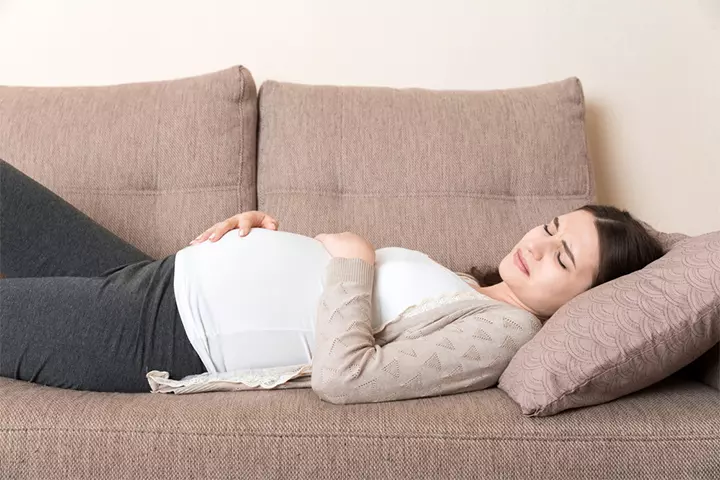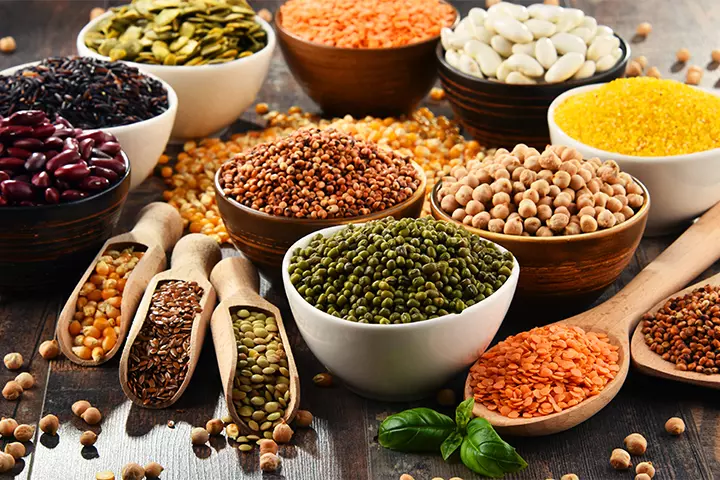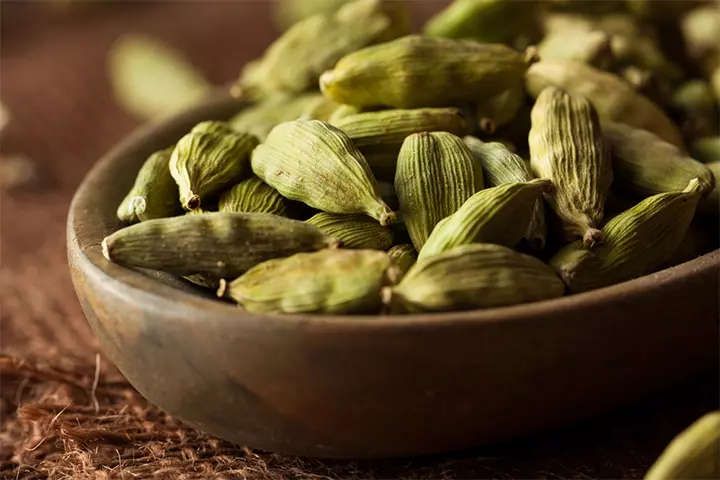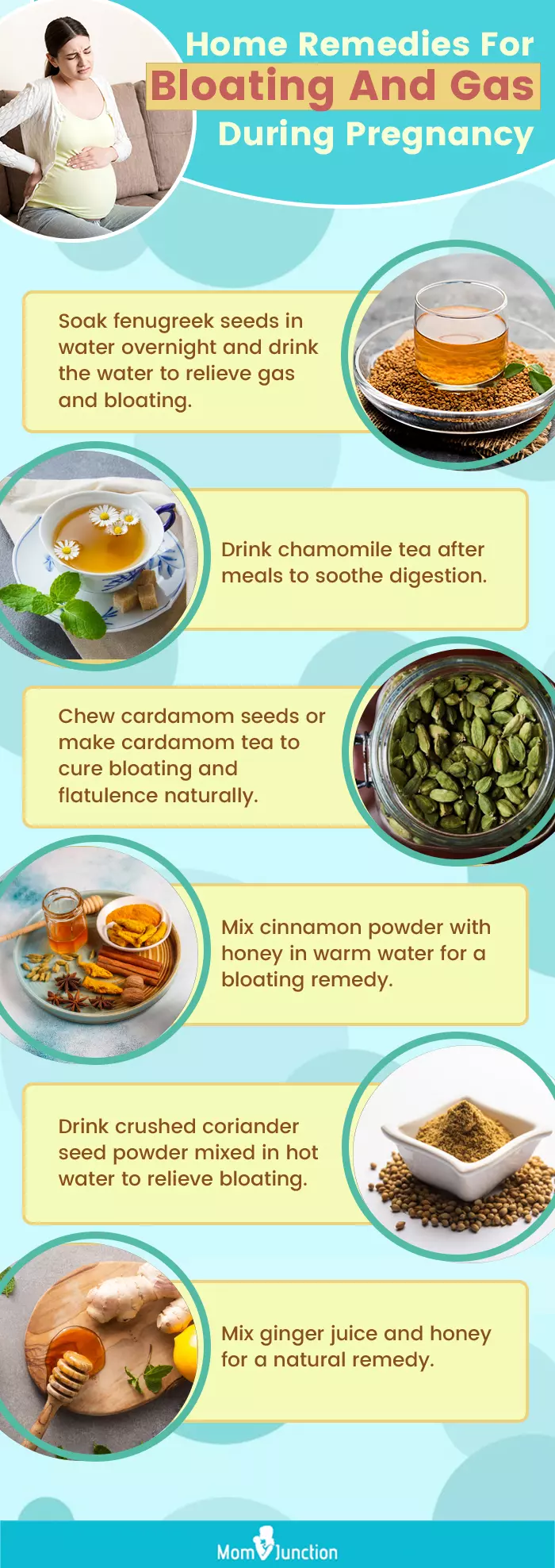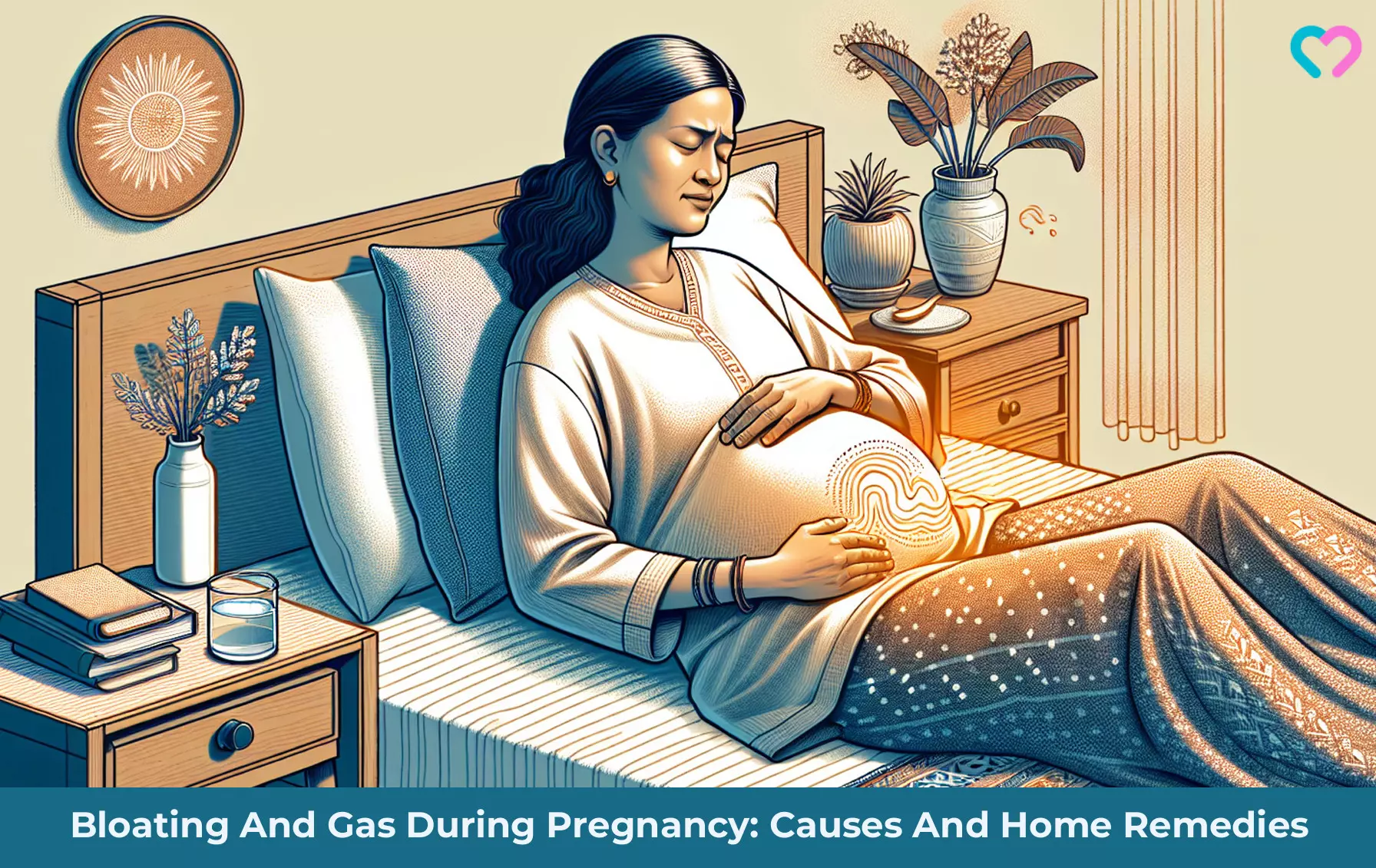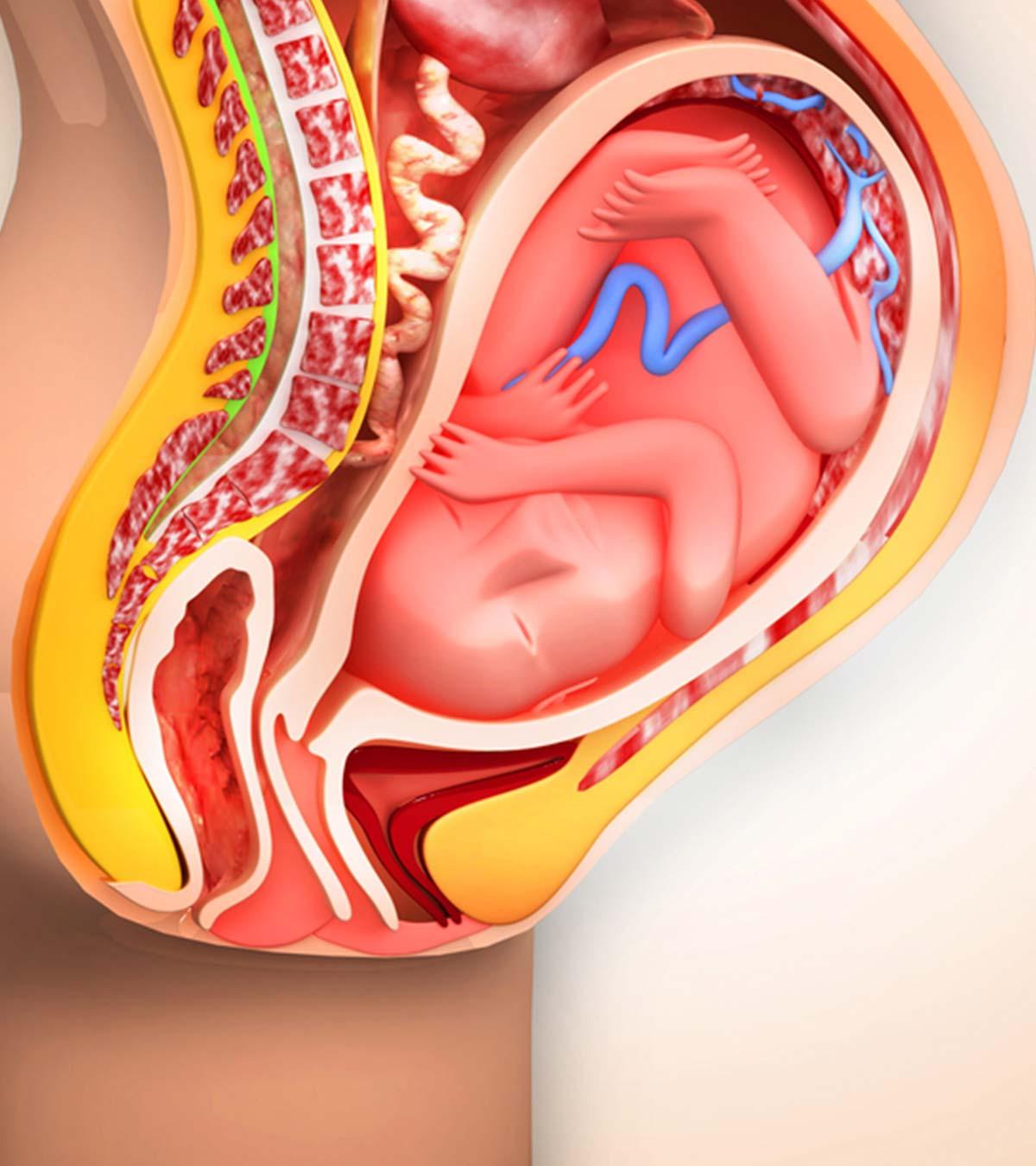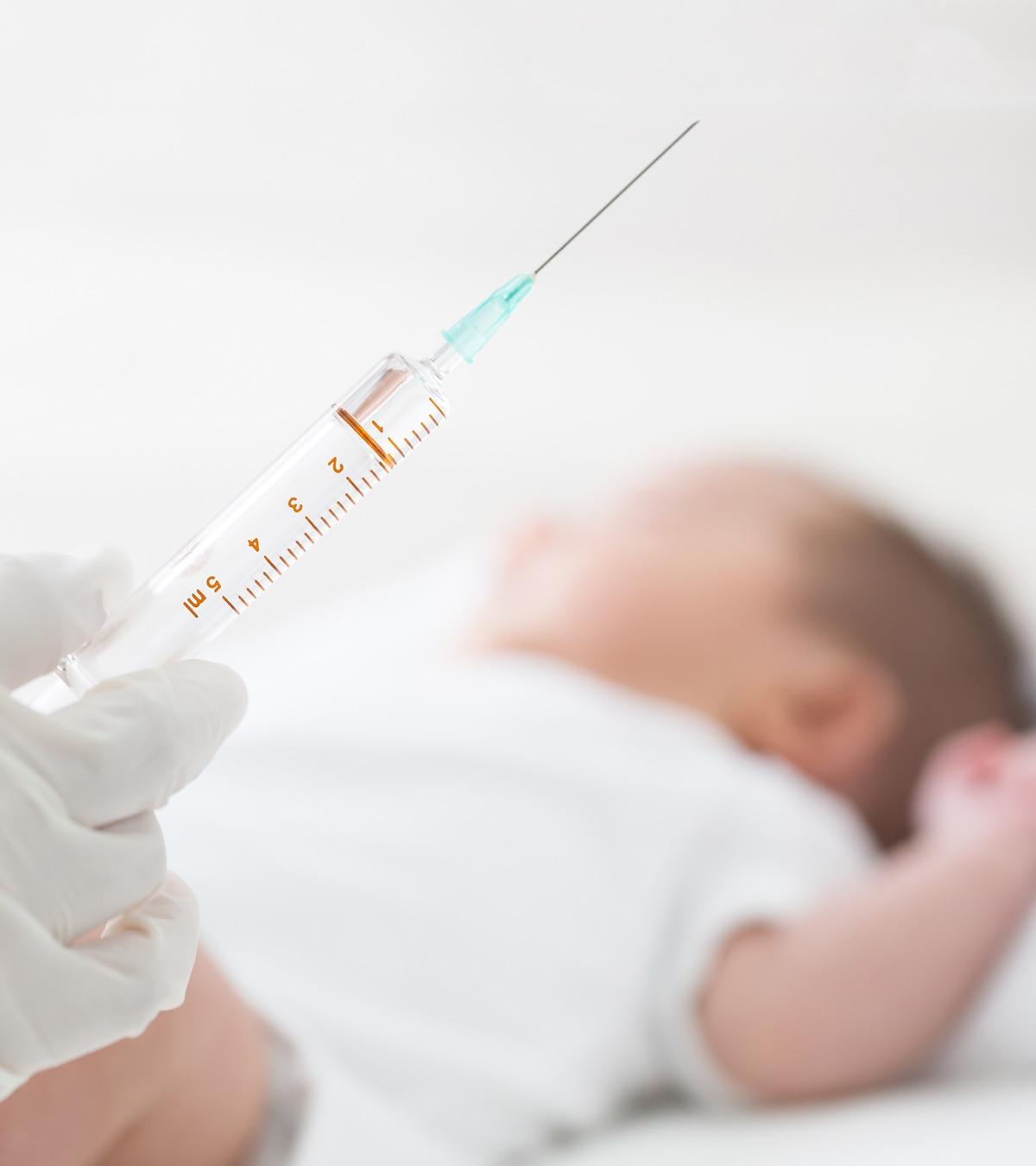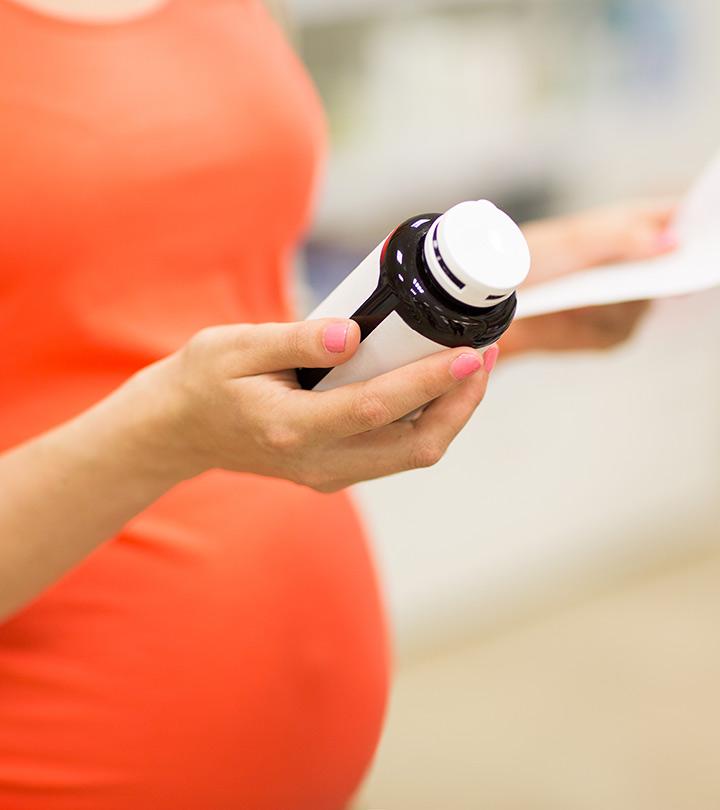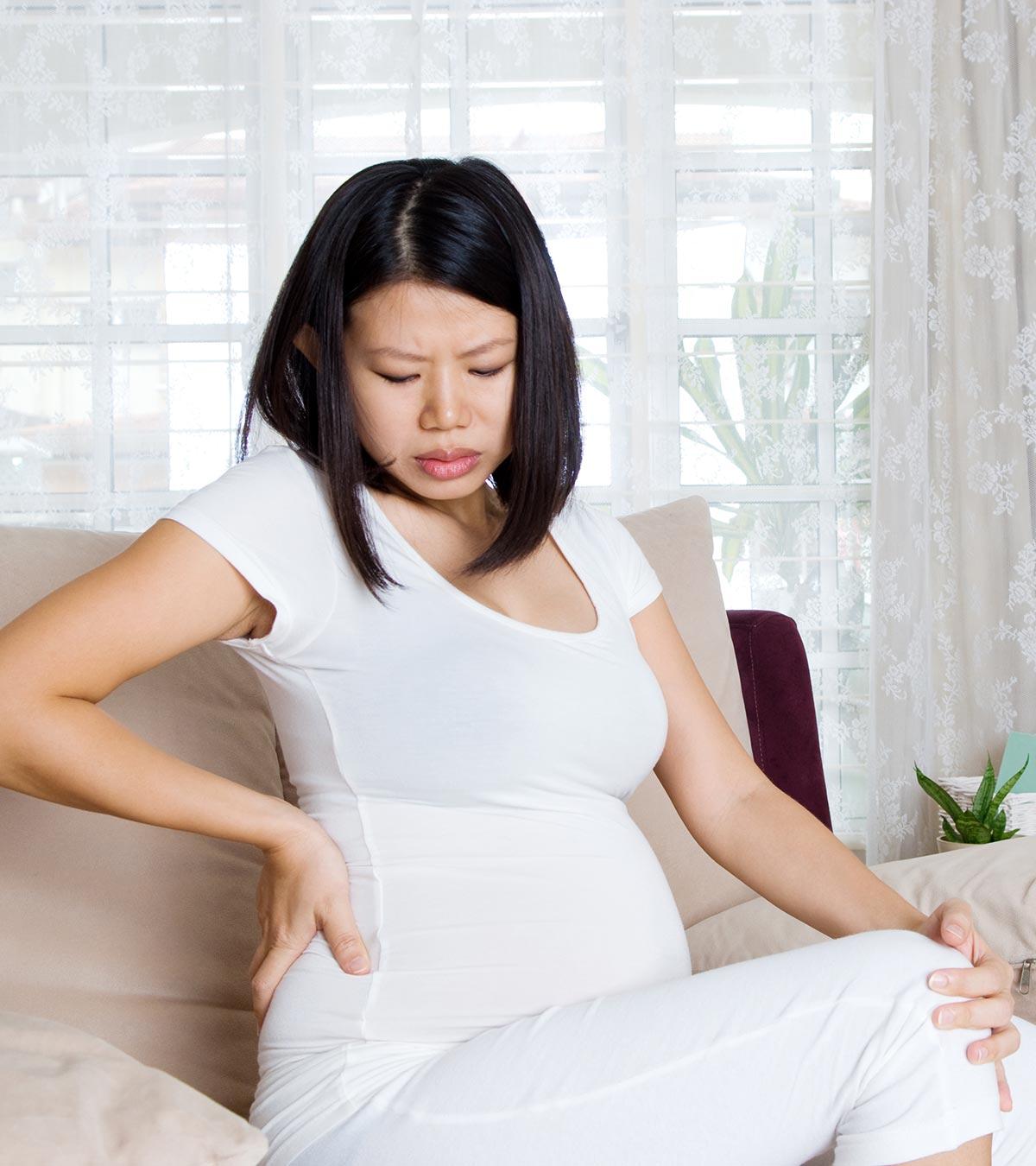
Image: iStock
Gas, burps, and flatulence – could be embarrassing. Most people pass gas ten to 20 times a day on average (1). And if we look at the average passing of gas during pregnancy, this number seems to go many notches up. But do not fret! These symptoms are common and often caused by hormonal changes during pregnancy. Many pregnant women experience these issues, and you are not alone. Here are some easy ways of reducing gas and bloating during pregnancy.
Key Pointers
- Gas and bloating are frequent symptoms during pregnancy caused by hormonal changes and the expanding uterus.
- Other causes of gas during pregnancy include bacterial growth in the colon, food intolerance, and constipation.
- Specific food items such as cabbage, onions, apples, wheat, lentil, prunes, and fennel seeds can also contribute to gas during pregnancy.
- To alleviate bloating, reducing the consumption of fried and processed foods, consuming more fiber-rich foods, and eating smaller, more frequent meals may be helpful.
Why Does Bloating Occur In Early Pregnancy?
The increasing progesterone levels during pregnancy relax all the muscles in the body, including those of the digestive tract.
This could slow down digestion, and gas builds up in the system, leading to burping, bloating, and flatulence. These develop uncomfortable sensations in the gut after a big meal (2).
Pilates teacher and expectant mom Kelly shares her firsthand experience with increased gas during the first trimester. She says, “Normal people burp and fart. When you’re pregnant, it increases in intensity and frequency. It’s pretty gross, I know. You probably might not want to read this, but it’s worth knowing that it happens a lot during pregnancy. Because food stays longer in the digestive tract when pregnant, this produces gas. And you really do need to get it out! For me, burping was hugely repulsive when the taste of my food emerged hours later, causing me to err toward the side of caution, opting for “safe food” that tasted as bland as possible (and nope, that didn’t even include porridge). Relatively, coming out through the rear end was typically a more palatable (albeit disgusting) way of getting rid of the gas. When the gas didn’t, or couldn’t, emerge, I had one of the worst experiences of bloating and twisting in my intestines, which sadly I don’t have a remedy for (i).”
Does Bloating Occur In Late Pregnancy?
Yes, bloating occurs in late pregnancy due to the growing uterus and hormonal surge. The uterine cavity occupies more room in the abdominal cavity, further pushing the stomach and causing digestive issues. This makes you feel more bloated after meals. As a result, you will also experience acidity, constipation, or heartburn during pregnancy (3).
Besides the hormonal surge, there are more causes of bloating during pregnancy.
Causes Of Bloating During Pregnancy
Image: Shutterstock
In addition to the increasing progesterone levels and growing uterus, there are other factors that cause intestinal gas and eventually lead to bloating and flatulence during pregnancy.
1. Constipation
The food travels through the digestive tract and remains in the intestine for a long time. This helps the fetus absorb all the nutritional content, including water. However, the absorption results in dry stools that take longer to reach the rectum, and the built-up fecal matter could increase gas and bloating (4).
 Did you know?
Did you know?2. Food sensitivity
Certain foods are likely to cause more gas than others. For instance, those having celiac disease cannot digest gluten products and could develop gas when they consume such foods (5).
The same is the case with those having lactose intolerance. You will find it hard to digest dairy products such as milk, and it could lead to gas. It is because the body cannot make enough lactase to break down lactose (present in dairy products) (6). If you are including these foods as a part of your prenatal health diet, you could talk to your doctor about creating a different meal plan.
3. Bacteria in the colon
If there is a variation in the bacterial balance in the colon, it results in more gas production, bloating, and flatulence.
4. Weight gain
Your hunger levels may surge, and you tend to eat more. Following a nutritious diet along with vitamin supplements will increase your calorie count, which will make you lethargic and less active. Therefore, you feel gassy, bloated, and uncomfortable with the progressing days.
Now you know why you feel gassy, but it helps to know how gas is formed in your digestive system.
 Quick fact
Quick factHow Is Gas Produced In The Body?
Gas is caught in the digestive tract in two ways – when you swallow air, and when bacteria break down undigested food in the intestine.
You release most of this gas from your stomach by burping. And flatulence occurs as a result of gas that travels down till the colon (large intestine).
Carbohydrates produce a lot of gas, unlike proteins and fats. Fats can slow down the digestion process as they take time to empty out the stomach, and it could lead to bloating (7).
Besides the above essential nutrients, there are certain foods that should be avoided to prevent gas and bloating.
Foods That Cause Gas And Bloating
Image: IStock
Some foods may cause smelly gas and bloating in some pregnant women (8).
Vegetables such as cabbage, cauliflower, beans, Brussels sprouts, onions, broccoli, artichokes, and asparagus contain unabsorbable carbohydrates, which cannot be digested. This could, therefore, produce sulfur-filled gases, resulting in a foul smell.
- Pulses such as chickpeas, lentils, green gram, and pigeon peas are great sources of fiber. But excessive intake of high fiber foods can lead to a gaseous stomach. However, in some individuals, a fiber diet could help relieve gas and bloating (9).
- Seeds such as sunflower, poppy, and fennel will also produce gas in the colon leading to flatulence.
- Fruits such as apples, mangoes, raisins, prunes, cherries, watermelon, and peaches also contain unabsorbable carbohydrates. Your body cannot digest them, and they pass down to the colon, causing flatulence along with gas.
- Soft drinks, wine, and beer can cause burping as they release carbon dioxide into your tummy.
- Fructose containing fruit juices can also cause gas and bloating.
- Wheat, wheat bran, and wheat products could lead to fermentation in the large intestine, therefore, causing gas and bloating.
- Sorbitol, an artificial sweetener found in some foods and drinks, could trigger gas formation.
In most cases, you do not require any treatment as gas and bloating fade away shortly after the baby’s birth.
Also, there are some home remedies and ways that can help you manage the uncomfortable, bloated feeling.
Home Remedies For Bloating And Gas During Pregnancy
The following remedies are considered safe when used in moderate amounts and also in later pregnancy. But be cautious about their usage in the first trimester as most herbs are associated with birth defects and various other complications (10). It is best to check with a doctor before following any home remedy.
- Soak a handful of fenugreek seeds in a glass of water overnight and discard the seeds the next morning. Keep sipping this water to get rid of gas and bloating.
- Have a fresh cup of chamomile tea after your meals. It will help soothe your digestive system and reduce gassy and bloated feeling.
- Chewing cardamom seeds helps cure bloating and flatulence naturally. You could also make cardamom tea by boiling two cups of water with six cardamom pods and a pinch of nutmeg powder. Have it fresh to help alleviate the problem.
Image: Shutterstock
- Mix one tablespoon of cinnamon powder with honey in a cup of boiling water. Have it fresh.
- Mix crushed coriander seeds powder in a cup of hot water. Strain the solution and drink it.
- Prepare a teaspoon of fresh ginger juice, add honey for taste. It makes an excellent remedy for bloating. A warm cup of ginger tea may also help reduce bloating. It can also be taken after meals.
- A heating pad for bloating may also be helpful. Take a heating pad and place it across your abdomen for 10-15 minutes, and then let your skin cool for sometime. Ensure the heating pad is not too hot to avoid burns. Repeat this a few times.
- A warm shower may also help with bloating and soothe any pain due to flatulence.
These remedies bring down bloating and flatulence and give you relief. You could also follow a few tips for additional comfort.
Dietary Tips To Reduce Bloating During Pregnancy
1. Eat small portions
Image: Shutterstock
You need your daily calorie count and eating smaller meals will be difficult during pregnancy. However, this helps reduce the bloated feeling. And to compensate for the smaller meals, you should eat frequently. Splitting your food into six small meals rather than three heavy meals will avoid overloading your digestive system and nourishing your baby too (11).
2. Take it slow
You should eat slowly to give each bite a chance to make its way through the digestive tract. You should not overload your gastrointestinal tract. Moreover, when you gulp down food quickly, there is a chance of swallowing air that ends as gas in the stomach. Take a few deep breaths before and during the meal to relax. Also, do not eat when stressed (11).
3. Consume fiber-rich foods
Yams, carrots, whole wheat toast, oatmeal, wholegrain bagels, apples, and pears are the best sources of fiber. Fiber absorbs water in the digestive system and transports the food smoothly through the intestines. It, therefore, keeps your bowel movements regular and relieves you of the bloated feeling. Start adding fiber foods to your diet at a slow pace if you are not used to them (12).
4. Cut down fried and gas-inducing foods
Foods such as onions, cabbage, broccoli, and beans are gas-inducing. Fried foods may not release gas in the stomach, but they can slow down your digestion process, leading to bloating. You must cut down on these foods to have a happy tummy (8) (11).
5. Cut off refined sugars
Sweet tooth during pregnancy is common. But you need to control the urge to consume refined sugars. Carbonated beverages and sweetened fruit juices also contain high levels of fructose corn syrup, which contributes to bloating. Choose fresh fruit juices of apricots, bananas, and peaches to satisfy your craving for candies and soda drinks. Avoid chewing gum and slimming foods as they contain sorbitol, which can cause gas and bloating during pregnancy (11) (13).
6. Take bitters
Consuming bitter foods in small amounts may help to stimulate the process of digestion, with a positive effect on bloating. Some great bitters include ginger, lemon juice in hot water, bitter salad leaves such as those of radicchio and rocket. Have them half an hour before your regular meals.
7. Maintain a food journal
Keep track of the foods you consume, and the volume of gas felt within six hours of every meal. Maintain a food diary to find out the foods that are causing a reaction.
8. Reassess your choice of foods
If you are keeping note, then you may know which foods are good for you and which do not give you bloating. You may consult a nutritionist to follow a perfect pregnancy diet. Always choose fresh foods rather than processed or frozen ones. You can choose organic foods, which are free of pesticides and genetically modified ingredients.
9. Increase intake of fluids
Increase your water intake to keep yourself hydrated. Boost your day with a glass of water and then keep sipping. Also, include fresh fruit juices in your diet. They help in flushing out toxins of the body, preventing bloating and constipation during pregnancy (14).
What if you still end up with a bloated tummy after trying all the above? Then, you could try some ways to relieve the abdominal discomfort.
How To Relieve Bloating In Pregnancy?
1. Laxatives
Though it is unwise to suggest medications, at times, they may be needed to get relief from bloating. Stool softeners contain an active ingredient known as docusate sodium, which is safe. It contains mineral oil, which is also safe. However, you should consult a healthcare provider before opting for any laxative (4).
 Quick tip
Quick tip2. Quit smoking
Smoking can cause many complications, such as acidity. You should quit smoking before you plan your pregnancy. If you find it difficult, you should attend a smoking cessation program (15).
3. Exercise
You should exercise every day to stay active, maintain a healthy lifestyle, keep your system running, alleviate gas, and prevent bloating. If you do not exercise and just sit the entire day, then the gas cannot move out of your system and may lead to bloating. Simple exercises such as pelvic rocks will also help in releasing the gas. But before you begin exercising, you must talk to a doctor (16).
4. Practice yoga and relaxation techniques
Image: IStock
Practice yoga or breathing and relaxation techniques with the help of an expert during pregnancy. If you have hyperventilation syndrome, which is being too anxious or excited, then you may breathe in more air.
Some useful yoga poses which may help to ease painful bloating and gas are:
- Extended side angle pose
- Triangle pose
- Sitting side stretch
- Cat and cow’s poses
- Child’s pose
Note:
Not all poses are suitable for pregnant women. You should always check with your health practitioner or yoga instructor before trying these exercises.
When To Call Your Doctor?
Gas and bloating are common during pregnancy. But if they are severe and accompanied by other symptoms, you should immediately contact a doctor:
- Greater abdominal pain and cramping
- Blood in the stools
- Contractions before 36 weeks of pregnancy
- Severe constipation and diarrhea Severe vomiting and nausea
For a better understanding of the condition, you could ask the doctor the following questions.
- Are symptoms such as bloating, gas, and constipation normal or is something wrong with the pregnancy?
- Is it safe to take mineral oil for relief?
- Are there any prescription medications for bloating?
- Would changes in diet help against bloating?
Depending on your condition and severity of the problem, the doctor may suggest medication.
Medications For Treating Gas And Bloating
Some medicines may offer you pain relief from gas and bloating. However, the below medications should only be taken on a doctor’s prescription:
- OTC Simethicone (Mylicon, Gas-X) for immediate gas relief (17)
- Antacids with low sodium content for bloated stomach and acid reflux (18)
After knowing all about why bloating and gas occur, you might want to know the answers to some of the commonly asked questions.
Frequently Asked Questions
1. Is bloating a sign of pregnancy?
Bloating could be one of the early signs of pregnancy, though pre-period bloating is hard to differentiate from bloating in early pregnancy. The heavy feeling is not because of the baby but due to the progesterone hormone that alters digestion by passing the nutrients to your baby through the bloodstream.
2. Is it normal to burp a lot during pregnancy?
It is quite normal to burp during pregnancy. The increasing progesterone slows down digestion and may lead to more gas production. Your body thus removes the gas by burps and farts.
3. Why does gas happen during the second and third trimesters?
In the second and third trimesters, the digestive system may slow down due to the growing uterus that pushes on your stomach. This leads to gas buildup and a bloated feeling. Though you cannot change the way your digestive system is working, you could avoid foods that aggravate bloating. These symptoms intensify in the third trimester, as the baby grows larger.
4. How long does bloating last In early pregnancy?
Bloating may show up around the 11th week of pregnancy and is likely to continue till delivery.
5. Do gas symptoms worsen with a twin pregnancy?
You are more likely to experience gas and bloating as hormone production and the growth of the uterus is more in the case of a twin pregnancy.
6. How can I debloat my stomach naturally?
You could debloat your stomach naturally by swapping all beverages with water, paying attention to your carbohydrate, fiber, and fat intake, avoiding sugars, alcohols, and choosing fruits and vegetables wisely.
7. Can my gas pain hurt the baby?
No, gas pain during pregnancy is not a concern for the health and safety of your child. It does not affect fetal development. Besides increasing your physical discomfort, the gas formation does not cause much problem (21).
8. Can certain foods worsen gas and bloating during pregnancy?
Yes, foods such as beans, broccoli, carbonated drinks, and high-fiber foods can increase gas production due to their fermentation in the digestive system. Monitor your diet and identify specific foods that trigger discomfort—avoid salty and fried foods. You may also consider eating smaller meals, checking your food portion size, staying hydrated, and chewing your food slowly to alleviate bloating and improve digestion.
Bloating and gas during pregnancy are common problems. A high progesterone level at this time is responsible for relaxing stomach muscles that aid gas buildup. In addition, certain food sensitivities or constipation may aggravate the condition. Unabsorbable carbohydrates are primarily responsible for gas production. Excess intake of cauliflower, broccoli, or Brussel sprouts in vegetables and apples, mangoes, or watermelons among fruits, may increase bloating and flatulence. Excess fiber intake, artificial sweeteners, fried food, and carbonated drinks may also be added. Consult your doctor before trying any home remedy or medications to relieve the discomfort.
Infographic: Ways To Alleviate Gas And Bloating At Home
Gas and bloating are common during pregnancy, especially during the second and third trimesters. It is important to consult with your doctor before trying any home remedies, as some may not be safe for pregnant women and can cause complications. Refer to the accompanying infographic for a list of safe ways to alleviate these symptoms. Illustration: Momjunction Design Team
Illustration: Bloating And Gas During Pregnancy: Causes And Home Remedies
Image: Dalle.E/MomJunction Design Team
Personal Experience: Source
MomJunction articles include first-hand experiences to provide you with better insights through real-life narratives. Here are the sources of personal accounts referenced in this article.
i. Things I didn’t know about pregnancy (1st trimester);https://pilatesandprints.wordpress.com/2020/08/09/things-i-didnt-know-about-pregnancy-1st-trimester/
References
1. Tina Comston; Farting – how much is normal and what can I do about it?; The Ohio State University
2. Body changes and discomforts; The U.S. Department of Health and Human Services
3. Common symptoms during pregnancy; The United States National Library of Medicine
4. Magan Trottier,et al.; Treating constipation during pregnancy
5. Celiac Disease; The National Institute of Diabetes and Digestive and Kidney Diseases; The National Institutes of Health
6. Lactose Intolerance; The National Institute of Diabetes and Digestive and Kidney Diseases; The National Institutes of Health
7. Gas in the Digestive Tract; The National Institute of Diabetes and Digestive and Kidney Diseases; The National Institutes of Health
8. Digestive complaints during pregnancy; The University of California, San Francisco
9. William L. Hasler; Gas and Bloating
10. Lisha J. John and Nisha Shantakumari; Herbal Medicines Use During Pregnancy: A Review from the Middle East
11. Health Tips for Pregnant Women; The National Institute of Diabetes and Digestive and Kidney Diseases
12. Christine Hsieh; Treatment of Constipation in Older Adults; The American Academy of Family Physicians
13. Tandeter H; Hypothesis: hexitols in chewing gum may play a role in reducing postoperative ileus.
14. Kristen S. Montgomery; Nutrition Column An Update on Water Needs during Pregnancy and Beyond
15. Pregnancy and Heartburn; Stanford Children’s Health
16. Prenatal and Newborn Resource Guide for Oregon Families OHA 9586 U.S. Department of Health and Human
17. Medications Safe for Use During Pregnancy; Von Voigtlander Women’s Hospital; Michigan Medicine
18. Ronald A. Black, et al.; Over-the-Counter Medications in Pregnancy; The American Academy of Family Physicians
19. Gastrointestinal Issues During Pregnancy; Multidisciplinary Obstetric Medicine Service
20. Constipation and Gas in Pregnancy; Kaiser Permanente
21. Pregnancy Gas; American Pregnancy Association
Community Experiences
Join the conversation and become a part of our nurturing community! Share your stories, experiences, and insights to connect with fellow parents.
Read full bio of Dr. Ben Abbes Taarji Hicham
Read full bio of Rebecca Malachi
Read full bio of Swati Patwal
Read full bio of Aneesha Amonz






